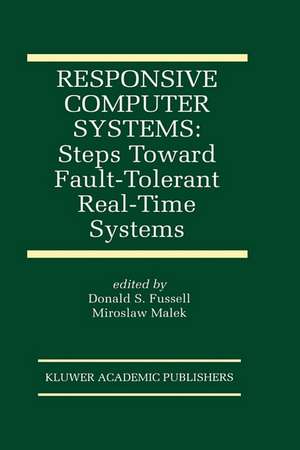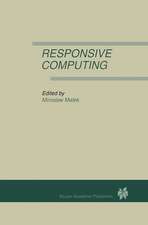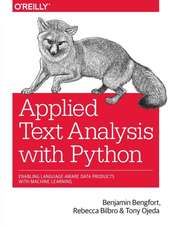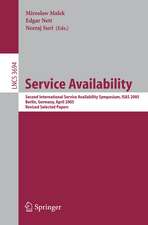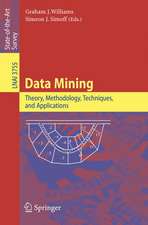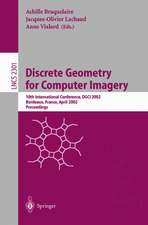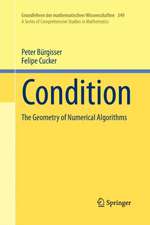Responsive Computer Systems: Steps Toward Fault-Tolerant Real-Time Systems: The Springer International Series in Engineering and Computer Science, cartea 297
Editat de Donald Fussell, Miroslaw Maleken Limba Engleză Paperback – 31 aug 1995
Audience: An interesting and important road map to some of the most important emerging issues in computing, suitable as a secondary text for graduate level courses on responsive computer systems and as a reference for industrial practitioners.
Din seria The Springer International Series in Engineering and Computer Science
- 24%
 Preț: 1041.98 lei
Preț: 1041.98 lei - 20%
 Preț: 643.50 lei
Preț: 643.50 lei - 18%
 Preț: 1225.62 lei
Preț: 1225.62 lei - 18%
 Preț: 965.02 lei
Preț: 965.02 lei - 20%
 Preț: 646.12 lei
Preț: 646.12 lei - 18%
 Preț: 948.79 lei
Preț: 948.79 lei - 20%
 Preț: 646.62 lei
Preț: 646.62 lei - 15%
 Preț: 637.46 lei
Preț: 637.46 lei - 20%
 Preț: 643.83 lei
Preț: 643.83 lei - 18%
 Preț: 949.23 lei
Preț: 949.23 lei - 20%
 Preț: 644.48 lei
Preț: 644.48 lei - 20%
 Preț: 994.92 lei
Preț: 994.92 lei - 20%
 Preț: 645.97 lei
Preț: 645.97 lei - 18%
 Preț: 946.87 lei
Preț: 946.87 lei - 20%
 Preț: 995.57 lei
Preț: 995.57 lei - 18%
 Preț: 956.99 lei
Preț: 956.99 lei - 20%
 Preț: 644.98 lei
Preț: 644.98 lei - 15%
 Preț: 649.54 lei
Preț: 649.54 lei - 18%
 Preț: 950.21 lei
Preț: 950.21 lei - 18%
 Preț: 1221.38 lei
Preț: 1221.38 lei - 18%
 Preț: 957.62 lei
Preț: 957.62 lei - 15%
 Preț: 643.99 lei
Preț: 643.99 lei - 18%
 Preț: 948.47 lei
Preț: 948.47 lei - 18%
 Preț: 947.35 lei
Preț: 947.35 lei - 20%
 Preț: 1284.65 lei
Preț: 1284.65 lei - 20%
 Preț: 1628.31 lei
Preț: 1628.31 lei - 20%
 Preț: 1285.78 lei
Preț: 1285.78 lei
Preț: 1277.70 lei
Preț vechi: 1597.12 lei
-20% Nou
Puncte Express: 1917
Preț estimativ în valută:
244.52€ • 254.34$ • 201.86£
244.52€ • 254.34$ • 201.86£
Carte tipărită la comandă
Livrare economică 14-28 aprilie
Preluare comenzi: 021 569.72.76
Specificații
ISBN-13: 9780792395638
ISBN-10: 0792395638
Pagini: 268
Ilustrații: XX, 268 p. 19 illus.
Dimensiuni: 155 x 235 x 18 mm
Greutate: 0.59 kg
Ediția:Softcover reprint of the original 1st ed. 1995
Editura: Springer Us
Colecția Springer
Seria The Springer International Series in Engineering and Computer Science
Locul publicării:New York, NY, United States
ISBN-10: 0792395638
Pagini: 268
Ilustrații: XX, 268 p. 19 illus.
Dimensiuni: 155 x 235 x 18 mm
Greutate: 0.59 kg
Ediția:Softcover reprint of the original 1st ed. 1995
Editura: Springer Us
Colecția Springer
Seria The Springer International Series in Engineering and Computer Science
Locul publicării:New York, NY, United States
Public țintă
ResearchCuprins
1 A Tight Lower Bound for Processor Coordination.- 1 Introduction.- 2 Overview.- 3 The Problem.- 4 The Bermuda Triangle.- 5 The Lower Bound.- 6 Generalizing to the Partially Synchronous Model.- References.- 2 Self-Stabilizing Real-Time Decision Systems.- 1 Introduction.- 2 Related Work.- 3 A Model of Computation.- 4 Definitions and Notation.- 5 Terminating Self-Stabilizing Programs.- 6 Boolean (Finite State) Programs.- 7 Non-Terminating Self-Stabilizing Programs.- 8 Self-Stabilization and Informed Decisions.- 9 Acknowledgements.- References.- 3 Management and Scheduling of Tests for Locating Failures Dependent Upon Operation-Time in Responsive Systems.- 1 Introduction.- 2 Definitions and Notation.- 3 Assignment and Scheduling of Multiple Test Sets.- 4 The Analysis of Fault Location.- 5 A priori information analysis.- 6 Conclusion.- References.- 4 Adding Robustness in Dynamic Preemptive Scheduling.- 1 Introduction.- 2 Terminology and Assumptions.- 3 Schedulability analysis.- 4 The RED scheduling strategy.- 5 Performance Evaluation.- 6 Related Work.- 7 Conclusions.- References.- 5 Static Deadlock Analysis for CSP-Type Communications.- 1 Introduction.- 2 The Sequence Condition.- References.- 6 Comparing How Well Asynchronous Atomic Broadcast Protocols Perform.- 1 Introduction.- 2 Assumptions.- 3 Overview of Broadcast Protocols.- 4 Simulation Results.- 5 Relative Performance.- 6 Conclusion.- References.- 7 Hard Real-Time Reliable Multicast in the Dedos System.- 1 Introduction.- 2 System architecture and failure assumptions.- 3 Protocol description.- 4 Protocol analysis.- 5 Conclusion.- References.- 8 Speculative Algorithms for Concurrency Control in Responsive Databases.- 1 Introduction.- 2 RTDBMS Concurrency Control.- 3 A Generic SCC-nS Algorithm.- 4 SCC-NS Family Members.- 5 Conclusion.- References.- 9 Autonomous Transaction Managers in Responsive Computing.- 1 Introduction.- 2 System Structure and Notation.- 3 Synchronization of the Local Schedules.- 4 Effects of Transaction Aborts.- 5 Synchronization of CSR Schedules.- 6 A Pragmatic Restriction.- 7 Further Observations.- 8 Conclusions.- 9 Appendix.- References.- 10 Adaptable Fault Tolerance for Real-Time Systems.- 1 Introduction.- 2 The Three-level Framework.- 3 FERT Specification Language.- 4 Support for Scheduling.- 5 Conclusions and Discussion.- References.- 11 Fault-Tolerant Automatic Control.- 1 Introduction to the Software Fault-Tolerance Problem.- 2 The Simplex Architecture.- 3 Laboratory Experiments.- 4 Conclusion.- References.- 12 Design and Performance Evaluation of A Fault-Tolerant, Hard-Real-Time, Parallel Processor.- 1 Introduction.- 2 FTPP Overview.- 3 Overview of FTPP Scheduling.- 4 OS Performance Measurements.- 5 NE Contention Model.- 6 Conclusions.- References.
